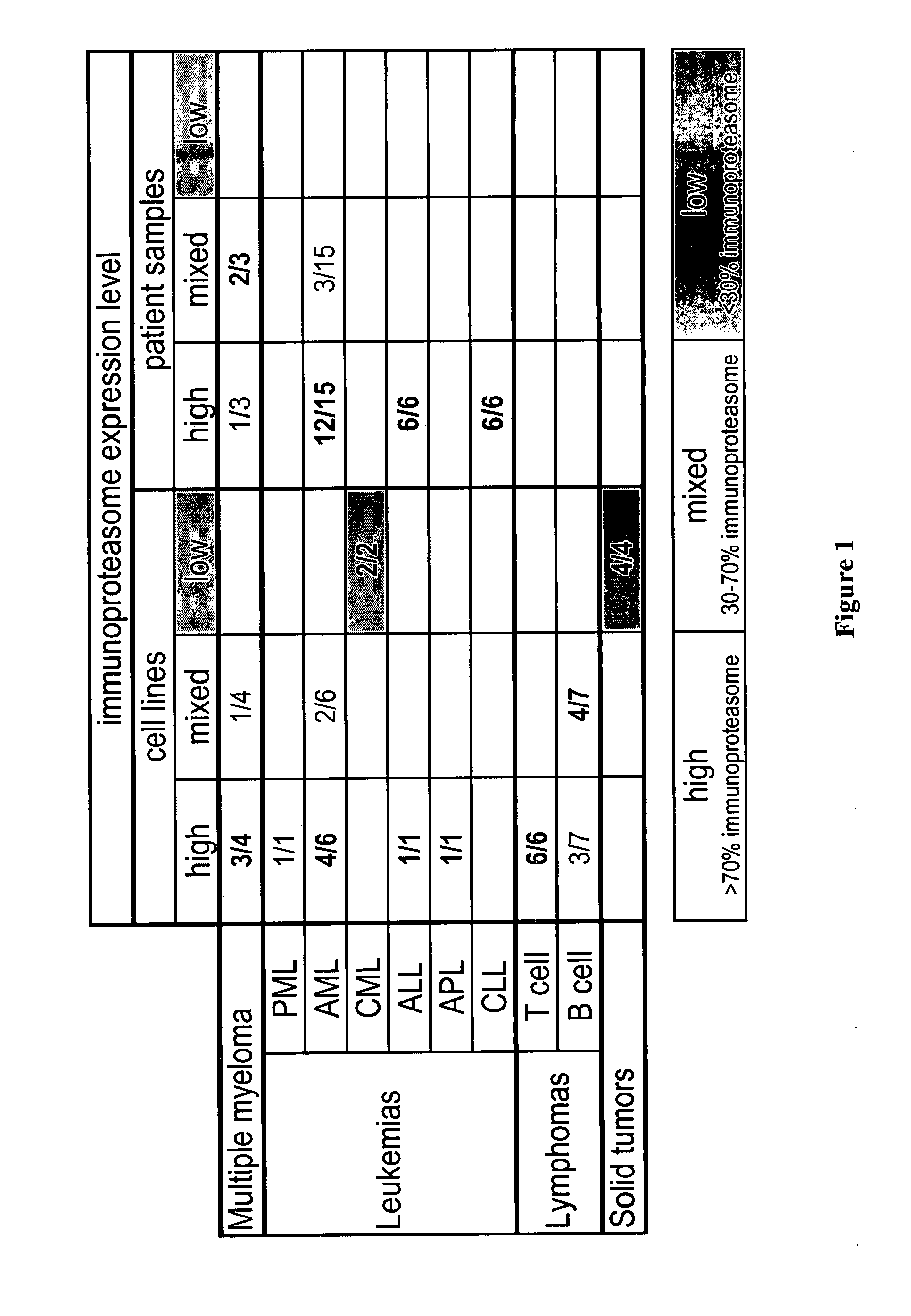Compounds for enzyme inhibition
a technology of enzyme inhibition and compound, which is applied in the field of compound for enzyme inhibition, can solve the problems of inability to explore and exploit the roles of each specific proteasome form at the cellular and molecular level, and compound general lack of specificity to distinguish between the two forms of proteasomes, etc., and achieve the effect of inhibiting immunoproteasome activity
- Summary
- Abstract
- Description
- Claims
- Application Information
AI Technical Summary
Benefits of technology
Problems solved by technology
Method used
Image
Examples
example 18
Assays to Determine Inhibitory Preference
[0476] There are three types of assays that can be utilized when determining whether or not a molecule preferentially inhibits the CT-L activity of the constitutive or immunoproteasome. Enzyme kinetic assays such as those disclosed in U.S. application Ser. No. 09 / 569748, Example 2 and Stein et al., Biochem. (1996), 35, 3899-3908 use isolated 20S proteasome preps with greater than 90% constitutive proteasome subunits or immunoproteasome subunits. The inhibitory preference of the molecule is then based on the EC50 ratio of the chymotryptic-like activity of the constitutive proteasome to that of the immunoproteasome (20S ratio).
[0477] Alternatively, the CT-L EC50 of a compound can be determined using 26S proteasome in the context of a cell lysate. Compound is added to lysate generated from cells that either predominantly express constitutive proteasome (e.g., HT29) or immunoproteasome (e.g., THP1). Again, the inhibitory preference is then base...
example 19
[0479] A suitable ELISA assay may be found in U.S. patent application Ser. No. 11 / 254541, incorporated herein in its entirety. Briefly, RPMI-8226 cells were treated with 0.1 nM to 1 μM of proteasome Inhibitor B. The samples were then washed with phosphate-buffered saline (PBS) and lysed in hypotonic buffer (20 mM Tris pH 8, 5 mM EDTA) (Tris-HCl and EDTA are available from Teknova, Inc., Hollister, Calif.). Cellular debris was removed by centrifugation at 14,000 rpm in a microfuge (4° C.) for 2 min. The supernatant was transferred to a fresh tube, snap frozen in liquid nitrogen and stored at −80° C. After thawing on ice, the samples (30 μl for assays run in triplicate) were treated with 500 nM of Inhibitor A for 1 hr at room temperature. Following treatment with Inhibitor A, the lysate was denatured by addition of seven volumes of 1% SDS (210 μl) (available from Bio-Rad, Hercules, Calif.) and heating at 99° C. with vigorous shaking for 5 min. The sample was allowed to coo...
example 20
Biological Results
[0487]
20S ratioLysate ratio(const:(HT29:Elisa ratioStructureimmuno)Sultan / Thp1)(beta5:LMP7)>1.0>3.0>1.0>2.0>2.0>3.0>2.0>3.0>5.0>1.0>2.0>5.0>1.0>5.0>1.0>1.0>3.0>2.0>1.0>1.0>3.0>2.0>5.0>3.0>5.0>3.0>3.0>3.0>5.0>2.0>5.0>3.0>2.0>5.0>5.0>3.0>3.0>3.0>2.0>5.0>2.0>5.0>5.0>3.0>5.0>5.0>3.0>5.0>5.0>5.0>5.0>3.0>3.0>1.0>2.0>5.0>5.0>5.0>5.0>3.0>5.0>2.0>3.0>5.0>3.0>5.0>1.0>2.0>5.0>2.0>2.0>3.0>5.0>3.0>5.0>5.0>5.0>5.0>2.0>2.0>5.0>3.0>3.0>2.0>5.0>2.0>2.0>5.0>2.0>1.0>5.0>5.0>5.0>2.0>3.0>3.0>1.0>5.0>1.0>1.0>2.0>5.0>2.0>2.0>3.0>3.0>3.0>5.0>2.0>3.0>1.0>1.0>1.0>3.0
PUM
| Property | Measurement | Unit |
|---|---|---|
| body weight | aaaaa | aaaaa |
| temperature | aaaaa | aaaaa |
| temperature | aaaaa | aaaaa |
Abstract
Description
Claims
Application Information
 Login to View More
Login to View More - R&D
- Intellectual Property
- Life Sciences
- Materials
- Tech Scout
- Unparalleled Data Quality
- Higher Quality Content
- 60% Fewer Hallucinations
Browse by: Latest US Patents, China's latest patents, Technical Efficacy Thesaurus, Application Domain, Technology Topic, Popular Technical Reports.
© 2025 PatSnap. All rights reserved.Legal|Privacy policy|Modern Slavery Act Transparency Statement|Sitemap|About US| Contact US: help@patsnap.com



